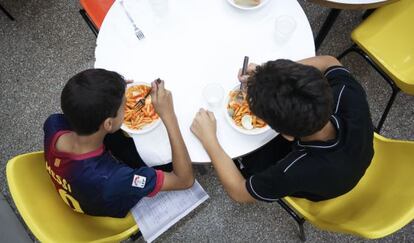Over half of children living with single mothers are at risk of poverty in Spain
Save the Children report calls for urgent measures to help single parent families


“I have two children under my care. My financial situation is disastrous. I have no job and have to live on what my husband gives me: €300 a month. That has to pay my rent, water, electricity, schooling costs…” So explains Manuela Macías, a 52-year-old single mother from Valencia. Her account of the difficulties she faces in bringing up her children is part of a report released last week by Save the Children, which concludes that in Spain more than half of children living with single mothers are at risk of poverty.
In the report, entitled Más solas que nunca (or, More alone than ever), the organization reports that single-parent homes have the highest levels of child poverty in Spain, and that a lack of employment opportunities and the difficulties of paying for accommodation are two key issues. These households are also likely not to have sufficient heating in winter.
More than a third of single mothers cannot afford to keep their home at an adequate temperature
Some 54% of children living in homes with single mothers are in poverty, a figure that is 12.5 percentage points higher than for the overall population, says the report. Correspondingly, 65% of women looking after children on their own say they face difficulties in making ends meet. At least three out of four single mothers has had to reduce fixed household costs, and 37.8% cannot afford to keep their home at an adequate temperature.
“These mothers have to take care of all family responsibilities without any help, and find it very difficult to balance their work and family lives. In this case, employment policies on their own are insufficient if they are not accompanied by social policies that favor conciliation and adequate care of their children,” says Andrés Conde, the director general of the Spanish division of Save the Children.
The number of single parent homes in Spain has increased, as shown by a recent survey carried out by the country’s National Statistics Institute (INE). The majority of them are single mothers (1,450,400, or 82.7% of the total of single parent homes, compared to 304,200 made up of single fathers). The number of homes where the sole breadwinner is a woman has grown by 2.7% between 2013 and 2014, and by 3.2% in the case of men. Overall, there has been a 2.7% increase on 2013
I am looking for work, but I’m getting old and companies do not want to employ older women”
These families are subject to greater risk of falling into poverty, not just because of their economic situation, but because of other factors, such as employment, housing, health, or lack of any support network, says Save the Children. A dearth of work opportunities is a major factor. More than half of single mothers do not work, compared to 69.9% of homes with children in which at least one parent has a job. “I am looking for work, but I’m getting old and companies do not want to employ older women. Sometimes I work in a bar or look after the daughter of one of my neighbors,” says Manuela Macías.
Economic hardship also affects the health of mothers and their children, says Save the Children’s report. More than one in four single mothers say that due to lack of money, they have been unable to buy medicines or to continue treatment for an illness. A recent survey by the Spanish Health Ministry showed that 5.2% of Spaniards say they cannot pay for the medicines prescribed by their doctor.
Policies to help single mothers
Save the Children is calling on the Spanish government and its regional counterparts to implement policies to help single mothers such as extending maternity leave payments (regardless of whether they are working or not) to women facing poverty with children aged three years or less, as well as providing €150 per month for each child.
The organization is also calling for children to be protected by law from eviction, and that single parent families be given priority in accessing low-cost housing and rent subsidies. At the same time, it recommends creating a maternity payment for mothers with no job or savings, and that maternity leave be extended to one year, among other suggestions.
Tu suscripción se está usando en otro dispositivo
¿Quieres añadir otro usuario a tu suscripción?
Si continúas leyendo en este dispositivo, no se podrá leer en el otro.
FlechaTu suscripción se está usando en otro dispositivo y solo puedes acceder a EL PAÍS desde un dispositivo a la vez.
Si quieres compartir tu cuenta, cambia tu suscripción a la modalidad Premium, así podrás añadir otro usuario. Cada uno accederá con su propia cuenta de email, lo que os permitirá personalizar vuestra experiencia en EL PAÍS.
¿Tienes una suscripción de empresa? Accede aquí para contratar más cuentas.
En el caso de no saber quién está usando tu cuenta, te recomendamos cambiar tu contraseña aquí.
Si decides continuar compartiendo tu cuenta, este mensaje se mostrará en tu dispositivo y en el de la otra persona que está usando tu cuenta de forma indefinida, afectando a tu experiencia de lectura. Puedes consultar aquí los términos y condiciones de la suscripción digital.








































